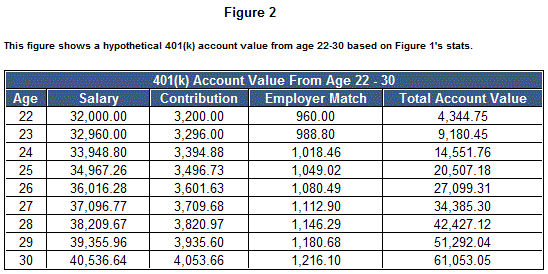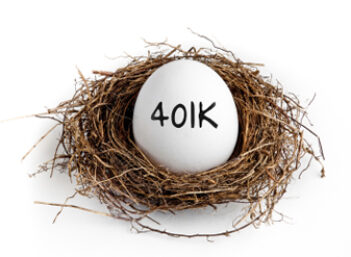You probably should have read this article before you took your first job out of college. And you definitely should have read it before you walked into your company's HR office and signed on the dotted line. But what is important is that you are reading it now.
Saving for retirement is the No. 1 long-term financial goal you should have. Unfortunately, many people don't start saving for retirement -- let alone even consider it -- until they are well on their way there.
Do you already have a 401(k) plan? Awesome. We'll provide you with a great comparison later in this article to see if you are on pace for a comfortable retirement. Haven't started yet and not sure where to begin? No need to panic. You came to the right place. Whether you've been saving since college or just now starting, contributing to a 401(k) can help you achieve your retirement goals. But before we get into the finer details of how much you should be contributing to your 401(k) at age 30, let's re-sharpen our 401(k) knowledge with a quick review:
401(k) Review
The 401(k) is a tax-deferred salary savings plan that companies offer to their employees as a retirement account. Employees contribute a certain percentage of their paycheck to the retirement account each pay period, up to the maximum amount allowed by the plan. Depending on the company, the employer may or may not match the contribution to the account made by the employee from payroll.
The contributed money is invested at the account holder's discretion, typically in mutual funds, and is allowed to grow tax-free. Withdrawals can be made penalty-free after the account holder reaches age 59.5 and are taxed as ordinary income at the employee's marginal income tax rate. Withdrawals prior to the account's designated retirement age will incur a penalty.
For most of us, the 401(k) is the most powerful financial tool that we will ever have for retirement. And while many people say that your home is the biggest investment you will make, I hope that's not true for you. It should be your 401(k) plan.
If you are near, at or in your 30s and haven't started saving, you might not be 'on pace' to retire comfortably -- or even at all. Read on to learn where your 401(k) should be at age 30.
401(k) Plan at Age 30
According to the World Bank, the GDP per-capita income in the United States in 2011 was $48,442. No one expects you to earn that right out of school, but hopefully you should be nearing or exceeding this mark by your 30s.
Let's assume you start out your career at age 22 with a $32,000/year salary. You are awarded annual 3% raises and you contribute 10% of your annual salary to your 401(k) plan. Your company also matches 50% on the first 6% you put in, and you invest at the rate of 8%. What should you have in your 401(k) at age 30? Take a look at Figures 1 & 2 below:
.gif)

If the sample 401(k) account above closely matches your own 401(k) account, your retirement would be worth $61,053.05 at age 30. That is a solid pace for retirement. But 401(k)s are long-term investments with many fates.
The Many Fates of Your 401(k) -- Choose Wisely
If you stopped investing at this point, you'd have almost a cool $1 million at age 65. Sounds like a lot -- but it's not. At least, it won't be. You'll need at least two-thirds of your salary in retirement, and your salary at age 65 will be more than $125,000/year. That means $1 million isn't enough to get you through 10 or 12 years.
If you keep investing, however, and continued to receive cost-of-living-based pay adjustments of only 3%, you will retire with at least $5.2 million. The best part: You only chip in $315,000 of this dough. Your company and the market -- and the miracle of compounding, tax-free returns -- do the rest.
At age 47, something even better could happen: Your annual 401(k) earnings would exceed your salary. At retirement you could transfer your account into municipal bonds and withdraw $200,000 a year tax-free without ever touching your principal. And that's just your account. The odds are you'll have a spouse, too. You both should contribute at least 10% of your salary. Maxing out is preferable.
It Is Never Too Late to Start Saving
Everyone should have a three-tiered financial goal. The first tier should be short-term objectives, such as saving for vacation, a wedding ring or an investment. The second is medium or longer-term goals, such as saving for your child's education. And the third should be a secure retirement absent any entitlement programs like Social Security.
Even if you're not close to matching our example, you have an alternative -- save more money moving forward. This will help you catch up and get back on pace for a comfortable retirement. By 'upping' your contribution, the IRS will let you tuck up to $16,500 into your 401(k) plan each year.
Even investors of modest circumstances can achieve financial goals -- including a comfortable retirement -- as long as you take advantage of your 401(k) plan.



